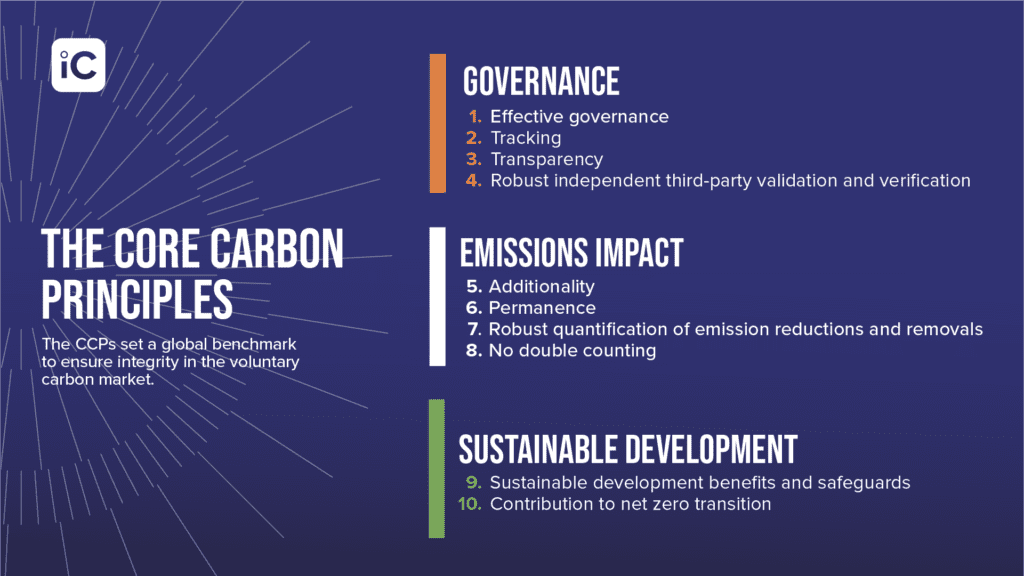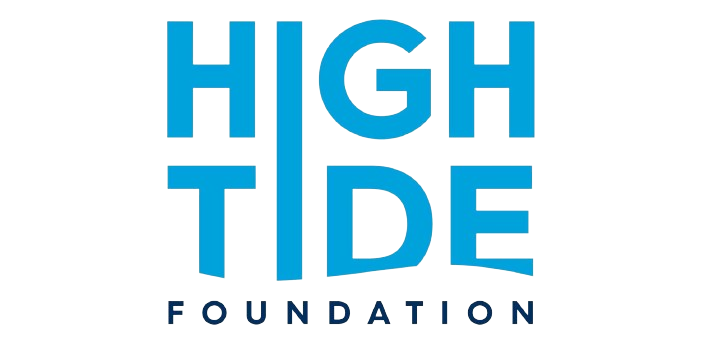The Core Carbon Principles
Building integrity and transparency in the voluntary carbon market
The Core Carbon Principles (CCPs) are ten fundamental, science-based principles for identifying high-quality carbon credits that create real, verifiable climate impact. Developed with input from hundreds of organisations, they set a global benchmark for high integrity in the voluntary carbon market to raise it to a consistent level of quality and ensure it accelerates progress towards the 1.5°C target.
The 10 Core Carbon Principles

A. Governance
1. Effective governance
The carbon-crediting program shall have effective program governance to ensure transparency, accountability, continuous improvement and the overall quality of carbon credits.
2. Tracking
The carbon-crediting program shall operate or make use of a registry to uniquely identify, record and track mitigation activities and carbon credits issued to ensure credits can be identified securely and unambiguously.
3. Transparency
The carbon-crediting program shall provide comprehensive and transparent information on all credited mitigation activities. The information shall be publicly available in electronic format and shall be accessible to non-specialised audiences, to enable scrutiny of mitigation activities.
4. Robust independent third-party validation and verification
The carbon-crediting program shall have program-level requirements for robust independent third-party validation and verification of mitigation activities.
B. Emissions Impact
5. Additionality
The greenhouse gas (GHG) emission reductions or removals from the mitigation activity shall be additional, i.e., they would not have occurred in the absence of the incentive created by carbon credit revenues.
6. Permanence
The GHG emission reductions or removals from the mitigation activity shall be permanent or, where there is a risk of reversal, there shall be measures in place to address those risks and compensate reversals.
7. Robust quantification of emission reductions and removals
The GHG emission reductions or removals from the mitigation activity shall be robustly quantified, based on conservative approaches, completeness and scientific methods.
8. No double-counting
The GHG emission reductions or removals from the mitigation activity shall not be double counted, i.e., they shall only be counted once towards achieving mitigation targets or goals. Double counting covers double issuance, double claiming, and double use.
C. Sustainable Impact
9. Sustainable development benefits and safeguards
The carbon-crediting program shall have clear guidance, tools and compliance procedures to ensure mitigation activities conform with or go beyond widely established industry best practices on social and environmental safeguards while delivering positive sustainable development impacts.
10. Contribution toward net zero transition
The mitigation activity shall avoid locking-in levels of GHG emissions, technologies or carbon-intensive practices that are incompatible with the objective of achieving net zero GHG emissions by mid-century.
Download the Core Carbon Principles, Assessment and Assessment Procedure in full and more in our Resources section
Benefits of the CCP label
Programs we approve will be able to use the CCP label on Categories of credits that we have approved. To be approved, Programs and Categories must meet the criteria set out in the CCP rulebook.
The CCP label is designed to set and maintain a global threshold standard for quality in the voluntary carbon market, making it easier for buyers to differentiate carbon credits that represent real and verifiable climate impact, based on the latest science and best practices. Programs can apply for assessment by submitting evidence that they adhere the CCPs through our application portal.

Why we need high-integrity carbon credits
The first-ever global stocktake warned that the world is significantly off track in meeting the goals of the Paris Agreement. We need every tool available working at full speed to reduce emissions and secure a liveable future for our planet. A high-integrity voluntary carbon market is an important, complementary tool that can help finance and accelerate the net zero transition.
Our Core Carbon Principles (CCPs) will raise the bar for carbon credit quality and help create transparency in the voluntary carbon market, making it easier for buyers to identify and price high-integrity carbon credits — no matter who issues them, what sort of project they fund, or where it is generated.
This will help reduce confusion, overcome market fragmentation, and give buyers confidence that they are funding projects which make a genuine impact on emissions, protect and promote nature and biodiversity, and put vital funding into the hands of the Indigenous Peoples and local communities, who are critical stewards of our core carbon sinks.

The Core Carbon Principles Rulebook
The Assessment Framework is the rulebook that sets out the detailed criteria we are using to assess whether carbon-crediting programs and Categories of carbon credits meet the 10 principles set out in the CCPs. Carbon-crediting programs that are CCP-Eligible will be able to use the CCP label on carbon credits from approved Categories





